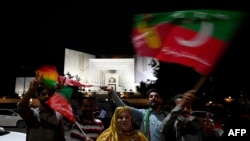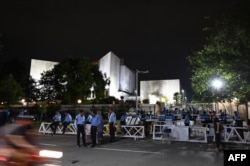Pakistan's top court Tuesday outlawed a recent disputed vote for the chief minister of the country's most populous Punjab province, and it instead ordered the installation of a candidate backed by ousted prime minister Imran Khan.
The Supreme Court verdict is a major blow to current Prime Minister Shehbaz Sharif, whose Pakistan Muslim League-Nawaz (PML-N) heads a multiparty ruling coalition in the center. It will also fuel political uncertainty in the country amid a crippling economic crisis and could pave the way for fresh national elections.
The three-judge panel removed Chief Minister Hamza Shehbaz, son of Sharif, from office and his rival Pervez Elahi swiftly replaced him as the head of the new provincial government in line with the ruling.
Elahi, whose Pakistan Muslim League-Quaid (PML-Q) is allied with Khan's opposition Pakistan Tehreek-e-Insaf (PTI) party, had secured the most votes in Friday's election for the chief minister in the provincial legislature. But the speaker canceled 10 votes cast in his favor over violations of polling rules and declared Shehbaz the winner.
On Tuesday, the court set aside the speaker's decision, saying that Elahi had been wrongfully denied victory.
Analysts said the judicial order will encourage Khan to intensify his anti-government campaign aimed at pressing Sharif to announce snap generation elections in Pakistan.
Punjab is known as Pakistan's breadbasket, and it is also the political stronghold of the Sharif party. Earlier this month, Khan's PTI won 15 of 20 seats in by-elections to the province legislature, securing the requisite majority to install a PTI-backed government there.
Khan was ousted as prime minister by then-opposition leader Sharif and his allies in a parliamentary vote of no-confidence in April. The nearly 70-year-old cricket-legend-turned politician declared his ouster as illegal, accusing his opponents of colluding with the United States to topple his government, charges Washington vehemently rejects.
The deposed prime minister has since drawn tens of thousands to rallies across the country, condemning the Sharif administration in his televised speeches as an "imported government" imposed on Pakistan by the alleged U.S.-led conspiracy.
Sharif's party criticized Tuesday's court ruling.
"The decision has not been accepted by the people, we will decide our future line of action after consulting coalition partners," Federal Information Minister Marriyum Aurangzeb said to a hurriedly called news conference in Islamabad.
The PTI and its allies now rule two of the four Pakistani provinces, including Punjab and northwestern Khyber Pakhtunkhwa. The PML-N does not control any provincial government. A coalition partner, the Pakistan People's Party, rules southern Sindh province, while regional parties run southwestern Baluchistan province.
The political uncertainty comes as the central government struggles to deal with the highest inflation facing Pakistan in many years. Central bank foreign exchange reserves also have rapidly depleted to about $9.7 billion, barely enough to cover a few weeks of imports.
Additionally, the government is trying to implement tough and politically unpopular economic reforms to address economic challenges.
Last week, Islamabad and the International Monetary Fund (IMF) agreed to revive a multibillion-dollar bailout package for the cash-strapped South Asian nation to help it tackle a payment crisis in the wake of the high global price of energy imports, mainly blamed on Russia's invasion of Ukraine.





